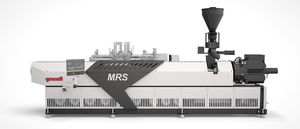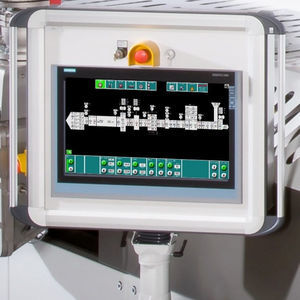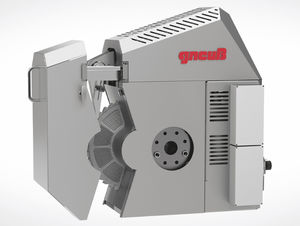
- Health - Safety - Environment
- Waste Treatment
- PET recycling unit
- Gneuß Kunststofftechnik GmbH
PET recycling line waterfor bottlesreactor
Add to favorites
Compare this product
Characteristics
- Applications
- PET, water
- Recycled product
- for bottles
- Other characteristic
- reactor
Description
Gneuss pelletising systems produce excellent quality pellets, which are thanks to the MRS extrusion process already suitable for processing to food contact products.
Technical options:
Underwater pelletizing (amorphous, spherical pellets)
Underwater strand pelletizing (amorphous, cylindrical pellets)
Strand pelletizing in an open water bath (amorphous, cylindrical pellets)
Direct crystallisation
JUMP reactor
Continuous SSP with consistent in- and output quality
Discontinuous SSP with varying qualities
The MRS extruder processes undried untreated PET bottle flake directly into pellets. The polymer melt is intensively and rapidly exchanged in the multiple screw section of the extruder. The huge surface area is exchanged at an unparalleled rate so that contaminants are efficiently evaporated out of the melt. A letter of Non-Objection (LNO) from the US food safety authority underlines the decontamination efficiency of the extrusion system. If a JUMP reactor or a downstream solid state polymerization system (SSP) is used in order to boost the intrinsic viscosity (IV), this can be specified far shorter than otherwise necessary as the extruder has already carried out the decontamination of the bottle flakes. The end product is of particularly high quality with regard to transparency and yellowness.
Advantages of Gneuss recycling lines for PET bottle to bottle recycling
Gneuss systems for PET bottle to bottle recycling offer numerous advantages for sustainable and high-quality recycling:
Decontamination of volatiles, oils and odors
Food contact compliance (US, Europe and other local certifications as well as from major global brand owners)
Extraction of residual monomers
Catalogs
No catalogs are available for this product.
See all of Gneuß Kunststofftechnik GmbH‘s catalogsOther Gneuß Kunststofftechnik GmbH products
POLYMER TECHNOLOGY
*Prices are pre-tax. They exclude delivery charges and customs duties and do not include additional charges for installation or activation options. Prices are indicative only and may vary by country, with changes to the cost of raw materials and exchange rates.















